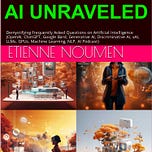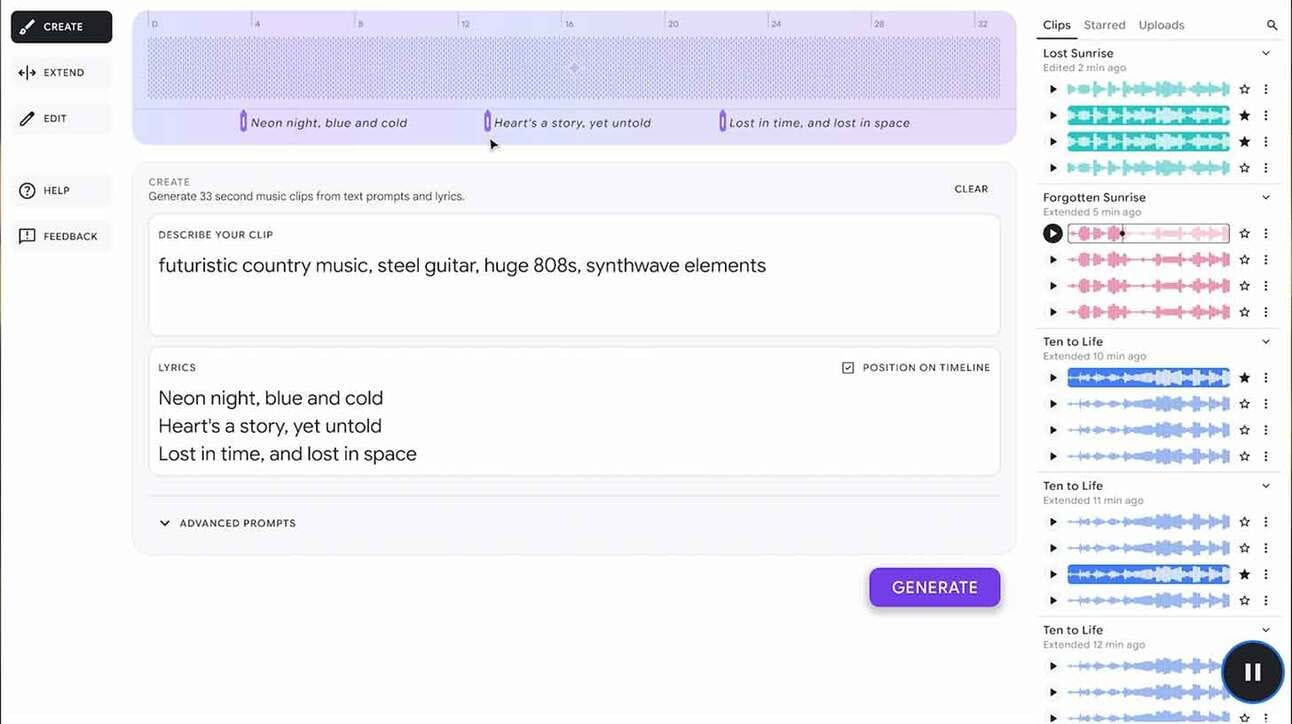A Daily Chronicle of AI Innovations on April 25th 2025
Perplexity announced a new browser designed for hyper-personalised advertising through extensive user tracking, mirroring tactics of other tech giants. Apple is shifting its robotics division to its hardware group, suggesting a move towards tangible consumer products. Simultaneously, Anthropiclaunched a research program dedicated to exploring the ethical implications of potential AI consciousness. Creative industries are also seeing progress with Adobe unveiling enhanced image generation models and integrating third-party AI, while Google DeepMind expanded its Music AI Sandbox for musicians. Furthermore, AI is increasingly integrated into the software development process, with Google reporting over 30% of new code being AI-generated. These advancements raise important discussions around privacy, ethics, transparency in research and professional fields, and the ongoing demand for AI infrastructure.
🕵️♂️ Perplexity's Upcoming Browser to Monitor User Activity for Hyper-Personalized Ads
Perplexity CEO Aravind Srinivas announced that the company's forthcoming browser, Comet, will track users' online activities to deliver highly personalized advertisements. The browser aims to collect data beyond the Perplexity app, including browsing habits, purchases, and location information, to build comprehensive user profiles. Comet is scheduled for release in May 2025.
Perplexity's chief executive officer revealed plans for its new browser, Comet, to monitor extensive user behavior online, gathering data far beyond the company's primary application.
This collected web activity, including purchase history and travel destinations, will help Perplexity build detailed user profiles necessary for delivering highly tailored advertisements within its platform.
Company leadership believes people will accept this level of observation because the resulting commercial messages displayed through features like the discover feed should be significantly more relevant.
What this means: This approach mirrors strategies employed by tech giants like Google and Meta, raising concerns about user privacy and data security. Users should be aware of the extent of data collection and consider the implications for their online privacy. [Listen] [2025/04/25]
🚀Google Workspace (Includes Google Meet, Gemini PRO, NotebookLLM) - 20% OFF
Hey everyone, hope you're enjoying this deep dive on AI Unraveled. You know, putting these episodes together involves a lot of research, scripting, and organization, especially when wrestling with complex AI topics. I wanted to share that a key part of my workflow relies heavily on Google Workspace.
I actually use its tools, especially integrating Gemini for brainstorming and NotebookLM for synthesizing research notes, to help craft some of the very episodes you love listening to. It helps me streamline the creation process significantly.
So, if you're feeling inspired by the possibilities we discuss, maybe even thinking about launching your own podcasting journey or creative project, I genuinely recommend checking out Google Workspace. Beyond the powerful collaboration and AI features I use, you also get essentials like a professional, personalized email address for your brand – like [Your Name]@[YourPodcast].com.
It's been invaluable for AI Unraveled, and it could be for you too. And if you're ready to jump in..."
Right now, you can try it free for 14 days, and as an AI Unraveled listener, you can get a special discount.
With Google Workspace, Get custom email @yourcompany, Work from anywhere; Easily scale up or down
Get 20% off Google Workspace Business Plan (AMERICAS) with the following codes:
Google Workspace Business Standard Promotion code for the Americas: 63P4G3ELRPADKQU 63F7D7CPD9XXUVT, 63FLKQHWV3AEEE6, 63JGLWWK36CP7W, M9HNXHX3WC9H7YE
Sign up using our referral link at https://referworkspace.app.goo.gl/Q371
Email us for more codes
🚀 Unlock Professional Audio Production with Our Partner, Speechify.
Discover Speechify, the premier destination for AI-driven audio solutions worldwide. Their comprehensive suite—featuring an advanced AI Voice Generator, precise Voice Cloning, and a versatile Dubbing Studio—enables creators and businesses to seamlessly produce exceptional audio from text.
Explore the possibilities with Speechify today: https://speechify.com/ai-voice-generator/?utm_campaign=partners&utm_content=rewardful&via=etienne
🤖 Apple's Secret Robotics Team Transitions from AI Division to Hardware Group
Apple is restructuring its internal teams by moving its secretive robotics unit from the AI division, led by John Giannandrea, to the hardware division under Senior Vice President John Ternus. This shift follows recent changes in Siri's leadership and suggests a strategic move to integrate robotics projects more closely with hardware development.
Apple is relocating its internal robotics unit from the artificial intelligence and machine learning division to the company's main hardware engineering department for future product oversight.
This previously obscured group has been researching advanced concepts like expressive AI lamps and potentially a tabletop home companion featuring a robotic arm and screen.
The departmental transfer could signify that the robotics initiative is progressing from early research stages into serious development for a potential consumer electronic device.
What this means: The transition indicates Apple's intent to accelerate the development of robotics hardware, potentially leading to new consumer products. It also reflects the company's efforts to streamline its AI and hardware initiatives for better synergy. [Listen] [2025/04/25]
🧠 Anthropic Launches AI Welfare Research Program
Anthropic has initiated a pioneering research program focused on "model welfare," exploring the ethical considerations of AI systems' potential consciousness and moral status. The program aims to develop frameworks to assess signs of distress or preferences in AI models, contributing to the broader discourse on AI ethics and safety.
Research areas include developing frameworks to assess consciousness, studying indicators of AI preferences and distress, and exploring interventions.
Anthropic hired its first AI welfare researcher, Kyle Fish, in 2024 to explore consciousness in AI — who estimates a 15% chance models are conscious.
The initiative follows increasing AI capabilities and a recent report (co-authored by Fish) suggesting AI consciousness is a near-term possibility.
Anthropic emphasized deep uncertainty around these questions, noting no scientific consensus on whether current or future systems could be conscious.
What this means: This initiative underscores the importance of addressing the ethical implications of advanced AI systems, ensuring their development aligns with human values and well-being. [Listen] [2025/04/25]
🎨 Adobe Unveils Firefly Image Model 4 and Integrates Third-Party AI Tools
At Adobe Max London 2025, Adobe introduced Firefly Image Model 4 and 4 Ultra, enhancing image generation capabilities with improved realism and user control. Additionally, Adobe's Firefly platform now supports third-party AI models from OpenAI and Google, expanding creative possibilities for users.
The new Firefly Image Model 4 and 4 Ultra boost generation quality, realism, control, and speed, while supporting up to 2K resolution outputs.
Firefly's web app now offers access to third-party models like OpenAI's GPT ImageGen, Google's Imagen 3 and Veo 2, and Black Forest Labs’ Flux 1.1 Pro.
Firefly’s text-to-video capabilities are now out of beta, alongside the official release of its text-to-vector model.
Adobe also launched Firefly Boards in beta for collaborative AI moodboarding and announced the upcoming release of a new Firefly mobile app.
Adobe’s models are all commercially safe and IP-friendly, with a new Content Authenticity allowing users to easily apply AI-identifying metadata to work.
What this means: These advancements provide creatives with more powerful tools for content generation, fostering innovation while maintaining commercial safety standards. [Listen] [2025/04/25]
💻 Transform Your Terminal into an AI Coding Assistant with Aider
In this tutorial, you will learn how to install and use OpenAI’s new Codex CLI coding agent that runs in your terminal, letting you explain, modify, and create code using natural language commands.
Make sure Node.js and npm are installed on your system.
Install Codex typing npm install -g @openai/codex in your terminal and set your API key using export OPENAI_API_KEY="your-key-here".
Start an interactive session with codex or run commands directly like codex "explain this function".
Choose your comfort level with any of the three approval modes, e.g., suggest, auto-edit, or full-auto.
What this means: Developers can enhance productivity and code quality by leveraging AI assistance seamlessly within their existing workflows. [Listen] [2025/04/25]
🎵 Google DeepMind Expands Music AI Sandbox with New Features
Google DeepMind has enhanced its Music AI Sandbox, a suite of experimental tools designed to assist musicians in generating instrumental ideas, crafting vocal arrangements, and exploring unique musical concepts. The updates aim to foster creativity and collaboration among artists.
The platform’s new “Create,” “Extend,” and “Edit” features allow musicians to generate tracks, continue musical ideas, and transform clips via text prompts.
The tools are powered by the upgraded Lyria 2 model, which features higher-fidelity, professional-grade audio generation compared to previous versions.
DeepMind also unveiled Lyria RealTime, a version of the model enabling interactive, real-time music creation and control by blending styles on the fly.
Access to the experimental Music AI Sandbox is expanding to more musicians, songwriters, and producers in the U.S. for broader feedback and exploration.
What this means: These tools offer musicians innovative ways to overcome creative blocks and experiment with new sounds, potentially transforming the music creation process. [Listen] [2025/04/25]
👨💻 AI Now Writing Over 30% of Google's Code
According to internal disclosures, AI tools are now responsible for generating over 30% of new code at Google, marking a dramatic shift in how major tech firms are leveraging AI to scale software development.
What this means: AI coding assistants are accelerating development cycles but also raising fresh challenges around software quality assurance and oversight. [Listen] [2025/04/25]
🔍 Science Sleuths Flag Hundreds of Papers Using AI Without Disclosure
Researchers have identified hundreds of scientific papers that utilized AI-generated text without properly disclosing it, raising alarm bells over transparency and the integrity of academic publishing.
What this means: The hidden use of AI in research highlights the urgent need for clearer guidelines around AI disclosures in scientific literature. [Listen] [2025/04/25]
🔬 “Periodic Table of Machine Learning” Could Fuel AI Discovery
MIT researchers have unveiled a “periodic table” of machine learning techniques, designed to help scientists rapidly identify which AI methods could solve their problems.
What this means: Organizing machine learning strategies like elements could make AI research more intuitive and speed up discovery across disciplines. [Listen] [2025/04/25]
⚖️ AI Helped Write California Bar Exam Questions, Officials Admit
California’s state bar examiners revealed that AI tools were used to help draft bar exam questions, without candidates being informed—stirring controversy over transparency and fairness.
What this means: AI’s influence in professional certification processes is growing, raising ethical concerns around disclosure and bias. [Listen] [2025/04/25]
🏭 Amazon and Nvidia Say AI Data Center Demand Remains Strong
Despite fears of an AI investment slowdown, both Amazon Web Services and Nvidia reported that demand for AI-focused data centers continues to grow at a rapid pace, driven by surging enterprise and cloud AI adoption.
What this means: Infrastructure to support AI workloads remains a booming sector, offering stability even amid economic uncertainty. [Listen] [2025/04/25]
What Else Happened in AI on April 25th 2025?
OpenAI reportedly plans to release an open-source reasoning model this summer that surpasses other open-source rivals on benchmarks and has a permissive usage license.
Tavus launched Hummingbird-0, a new SOTA lip-sync model that scores top marks in realism, accuracy, and identity preservation.
U.S. President Donald Trump signed an executive order establishing an AI Education Task Force and Presidential AI Challenge, aiming to integrate AI across K-12 classrooms.
Loveable unveiled Loveable 2.0, a new version of its app-building platform featuring
“multiplayer” workspaces, an upgraded chat mode agent, an updated UI, and more.
Grammy winner Imogen Heap released five AI "stylefilters" on the music platform, Jen, allowing users to generate new instrumental tracks inspired by her songs.
Higgsfield AI introduced a new Turbo model for faster and cheaper AI video generations, alongside seven new motion styles for additional camera control.
🚀 Unlock Professional Audio Production with Our Partner, Speechify.
Discover Speechify, the premier destination for AI-driven audio solutions worldwide. Their comprehensive suite—featuring an advanced AI Voice Generator, precise Voice Cloning, and a versatile Dubbing Studio—enables creators and businesses to seamlessly produce exceptional audio from text. Ideal for crafting persuasive ads, engaging YouTube content, effective e-learning modules, immersive audiobooks, polished podcasts, and countless other applications. Partner with a renowned brand trusted for quality and conversion success. Explore the possibilities with Speechify today: https://speechify.com/ai-voice-generator/?utm_campaign=partners&utm_content=rewardful&via=etienne


















Share this post